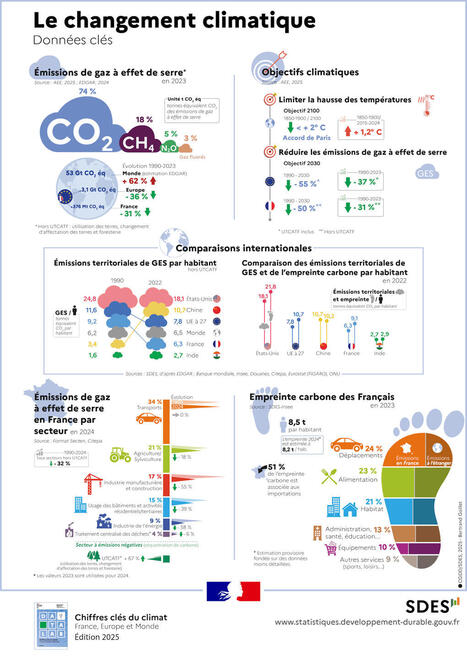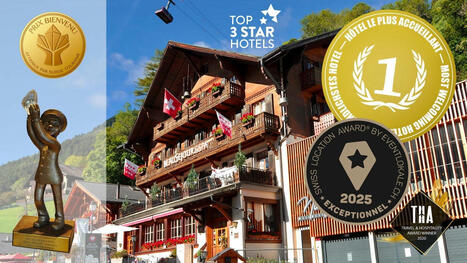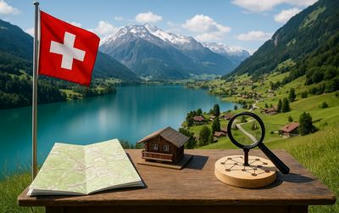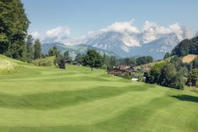 Your new post is loading...
 Your new post is loading...

|
Scooped by
Roland Schegg
December 4, 6:48 AM
|
The pace of travel is accelerating in unexpected ways. Consumer expectations shift almost daily, new technologies scale quickly, and global events continue to reshape demand without warning. In this environment, travel leaders are expected to interpret emerging signals early and act with clarity and purpose.
At the same time, airlines, hospitality groups, and other travel brands now operate without a true off-season. Guest engagement, operations, and service delivery constantly evolve, and the organizations that succeed are the ones that anticipate change, experiment, and stay ahead of traveler needs.

|
Scooped by
Roland Schegg
November 20, 3:59 AM
|
HRS hat seinen zweiten „State of Sustainability in Corporate Travel“-Report veröffentlicht. Die jährliche Studie untersucht, wie Unternehmen Nachhaltigkeit in ihren Geschäftsreiseprogrammen verankern und wie sich Hotelanbieter anpassen, um diesen Anforderungen gerecht zu werden. Die Ergebnisse wurden auf der Europe Conference der Global Business Travel Association in Hamburg vorgestellt.
Nachhaltigkeit bleibt Top-Priorität trotz wirtschaftlicher Turbulenzen
Der Bericht erscheint in einer Zeit, die von volatilen wirtschaftlichen Rahmenbedingungen, sich verändernden geopolitischen Prioritäten sowie Kosten- und Compliance-Druck geprägt ist. Ungeachtet dieser Turbulenzen belegt der Report, dass Nachhaltigkeit für fast 90 Prozent der Unternehmenskunden von HRS weiterhin eine der drei Top-Prioritäten darstellt.
Die UN hatten erst kürzlich festgestellt, dass die Staaten weiterhin „weit davon entfernt sind, die Ziele des Pariser Abkommens von 2015 zur Begrenzung der Erwärmung zu erreichen“.

|
Scooped by
Roland Schegg
November 5, 10:20 PM
|
"L’équilibre climatique est perturbé essentiellement par les émissions de gaz à effet de serre (voir glossaire). Les conclusions de la communauté scientifique, synthétisées par le Giec (voir glossaire), font désormais consensus sur le rôle des activités humaines dans ce changement. De nombreux indicateurs, tels que l’augmentation des températures à la surface de la Terre ou l’élévation du niveau moyen des océans, mettent en évidence un changement du climat depuis le siècle dernier. Une sélection d’observations de ce changement et de ses conséquences sont présentées, à l’échelle du monde puis de la France. Cette partie présente également des projections des conséquences du changement climatique selon différents scénarios."

|
Scooped by
Roland Schegg
October 30, 5:16 AM
|
Drei globale Studien – von Booking.com, Trip.com & Google sowie Hilton – zeigen ein klares Bild des Reisejahres 2026: Reisen wird persönlicher, bewusster und technischer. Künstliche Intelligenz wird zum Reisebegleiter, Sinnsuche ersetzt Konsumtourismus, und Stille wird zum neuen Luxus. Die Branche steht an der Schwelle zu einer Ära, in der Technologie und Achtsamkeit Hand in Hand gehen. Hotel Inside fasst die wichtigsten Erkenntnisse, Thesen und Trends zusammen:

|
Scooped by
Roland Schegg
October 27, 11:26 AM
|
Travel across Europe, the Middle East, and Africa is entering a new phase, marked by tech-driven planning, a desire for authenticity, and growing environmental awareness. The 2026 EMEA Ticket to Travel Report, based on insights from 22,000 travelers, highlights how preferences are evolving — and how the industry must adapt to meet new expectations.
Key takeaways
AI becomes mainstream: Half of all travelers now use AI for trip planning, up from 26% two years ago. Younger generations lead adoption, but older travelers are quickly catching up.
Emerging destinations rise: Lesser-known cities such as Oslo, Muscat, Split, and Zagreb are gaining traction as travelers seek authentic, less commercialized experiences.
Luxury redefined: “Lux-scaping” — adding a touch of luxury at the start or end of a trip — is growing, especially among younger travelers, who value personalized, experience-based indulgence.

|
Scooped by
Roland Schegg
October 23, 3:44 AM
|
"Der neue Trendbericht „Unpack ’26“ der Expedia Group zeigt: Die globale Reisebranche steht vor einer Phase des bewussteren und vielfältigeren Reisens. Grundlage der Studie sind interne Daten und eine weltweite Umfrage unter 24.000 Reisenden, die konkrete Einblicke in künftige Bedürfnisse, Interessen und Beweggründe liefert.
Nachhaltigkeit und smarte Destinationen
Zu den auffälligsten Ergebnissen zählen die wachsende Bedeutung nachhaltiger Reiseziele und die Einführung des sogenannten Smart Travel Health Checks – einem Bewertungssystem, das sich an den Prinzipien des World Travel and Tourism Council (WTTC) orientiert. Es bewertet Destinationen nach Nachhaltigkeitskriterien und fördert weniger bekannte, umweltbewusste Reiseziele, um überlaufene Metropolen zu entlasten."

|
Scooped by
Roland Schegg
October 20, 7:43 AM
|
Die Diskussion um Künstliche Intelligenz (KI) in der Branche hat sich von der Frage des Ob auf die des Wieverlagert. Unsere letzte Studie, die auf einer Umfrage bei 80 Hotels im Sommer 2025 basiert, bestätigt diese Dynamik: Über 70 % der Befragten halten KI für den Erfolg ihres Hotels innerhalb der nächsten zwei Jahre für wichtig.
Allerdings besteht eine klare und signifikante Lücke zwischen dem Bewusstsein für KI und der formalen strategischen Umsetzung. Während fast 40 % von den Hoteliers KI im Rahmen breiterer Digitalisierungsbemühungen diskutieren, hat nur eine kleine Minderheit (9 %) diese Themen in einem formalen Strategiedokument verankert. Diese Trägheit schafft eine KI-"Experimentierfalle".

|
Scooped by
Roland Schegg
October 14, 3:06 AM
|

|
Scooped by
Roland Schegg
October 13, 3:57 AM
|
Is sustainability the best we can do or is it time to move beyond sustainability and towards regeneration?
Here at Intego, we believe sustainability has its place, but the reality of what’s needed to transform our systems is more complex than that. Think about the cumulative damage we’ve done to the environment over the last decades.
Surely, we must agree it’s something that needs restoring and, ultimately, regenerating. There’s a lot of talk about net-zero impact. What’s missing from that view is the answer to the question: how do we counteract the damage already done? This is why we need to move beyond sustainability and towards regeneration.

|
Scooped by
Roland Schegg
October 1, 3:37 AM
|
Luxury hospitality is entering a new era. No longer satisfied with offering indulgence alone, it increasingly embraces the language of restoration: guests are invited to take part in coral reef projects, rewilded landscapes, or collaborations with local artisans. The promise is alluring — a chance to indulge while also contributing to something meaningful.
But beneath the appeal lies a sharp tension. Luxury, by definition, is scarce, accessible only to a few. Regeneration, by definition, requires scale, participation, and collective benefit. Can these two logics coexist?

|
Scooped by
Roland Schegg
September 30, 10:37 AM
|
Zum internationalen Tag gegen Food Waste verweist das Schweizer Gastgewerbe auf Fortschritte bei der Reduktion von Lebensmittelabfällen. Laut einer Umfrage von Gastrosuisse ergreift bereits über die Hälfte der Betriebe konkrete Massnahmen.

|
Scooped by
Roland Schegg
September 16, 10:39 AM
|
Seit über 25 Jahren fördert Seco über Innotour touristische Innovationen. Eine aktuelle Evaluation zeigt: Die Anschubfinanzierung wirkt – fast 80 Prozent der Projekte laufen weiter.

|
Scooped by
Roland Schegg
September 11, 9:56 AM
|
Wer hat im Sommer 2024 einen Kulinarikurlaub mit Aktivitäten zu Wein & Winzer in Österreich gemacht? Welche anderen Aktivitäten wurden unternommen und welche Unterkünfte waren besonders beliebt? Wie unterscheiden sich die Gäste, ihr Urlaubsverhalten und ihre Einstellungen zum typischen Sommergast?
Wir definieren die Weinurlauber:innen für den Bericht als Befragte, die angegeben haben, eine Kulinarische Reise / Weinreise verbracht zu haben UND Aktivitäten zu Wein & Winzer gemacht haben. Das waren im Sommer 2024 1,4% aller Gäste in Österreich. Der Anteil ist seit dem Höhepunkt in der Pandemie etwas zurückgegangen.
Beispielerkenntnisse:
Herkunft: Weinurlauber:innen kommen in erster Linie aus dem Inland (ca. 60%), Deutschland und den USA. Der Anteil Amerikaner unter den Weinurlaubern ist fast vier Mal so hoch wie der Anteil amerikanischer Gäste grundsätzlich in Österreich.
|

|
Scooped by
Roland Schegg
December 3, 3:27 AM
|
Travelers heading into 2026 are shifting away from conventional holidays and embracing more personal, purposeful, and experience-rich journeys. According to the report from Skyscanner that underpins the article, this means trips shaped not just by destinations, but by what travellers want to feel and discover: local beauty rituals, everyday food culture, high-altitude escapes, and more meaningful connections with places. The article argues that travel in 2026 will be defined by authenticity, personal rhythm, and a desire for deeper experiences rather than surface-level tourism. Overall, travel is becoming more intentional, grounded, and reflective of individual values and desires.

|
Scooped by
Roland Schegg
November 15, 1:21 AM
|
Seit jeher prägen Archetypen das Verhalten von Reisenden. Der Psychologe Carl Gustav Jung beschrieb sie als universelle Muster, die unser Handeln beeinflussen. Für Hotels bedeutsam: Wer erkennt, welchen Archetyp ein Gast verkörpert, versteht dessen Bedürfnisse besser, sagt Valentina Clergue, EHL, PhD in Konsumverhalten.
Zehn Reisetypen im Überblick
1. Der Kulturmensch
Sucht authentische Begegnungen, regionale Küche und geschichtsträchtige Orte. Laut Skift «European Travel Insights 2025» zählen rund 38 Prozent der Reisenden zu diesem Typus.
2. Der Abenteurer
Erlebt gerne Neues – ob Wüste oder Bergwelt. Laut Skift umfasst dieses Segment rund 32 Prozent. Viele suchen Natur und Abstand zum Massentourismus. Auch der Explorertyp fällt darunter, mit Fokus auf Perspektivenwechsel und kalkulierte Risiken.
3. Der Luxusreisende
Erwartet Komfort, Exklusivität und persönliche Betreuung. Laut Skift gehört rund 17 Prozent der globalen Reisenden zu dieser Gruppe. Oft wird Luxus mit Ruhe und Nachhaltigkeit verbunden.
4. Der Wellnessgast
Stellt mentale und körperliche Erholung ins Zentrum. Der Markt wächst: Das Global Wellness Institute prognostiziert bis 2029 ein Volumen von 1,1 Billionen US-Dollar.
5. Der Umweltbewusste
Bevorzugt transparente Nachhaltigkeit und glaubwürdige Konzepte. Gemäss Skift sind es rund 17 Prozent. EHL-Forschungen unterscheiden sieben Untergruppen – von regionalitätsorientierten bis zu Green Enthusiasts.

|
Scooped by
Roland Schegg
October 30, 1:29 PM
|
Est-ce que le tourisme est vraiment le meilleur moyen de répondre aux besoins des parties prenantes d’un territoire ou d’une destination ?
Pas forcément… et c’est justement ce qui rend la question si intéressante.
Dans cet épisode avec Sarah Balet, experte en durabilité, nous interrogeons la capacité du tourisme régénératif à répondre aux besoins uniques de chaque territoire. Un sujet vaste, essentiel, qui touche au cœur de nos choix de société. Au-delà des modèles standardisés, nous parlons de transition écologique et sociale, de responsabilité partagée et d’un leadership régénératif qui ouvre des chemins porteurs de sens. Une conversation essentielle pour imaginer le tourisme de demain.

|
Scooped by
Roland Schegg
October 29, 10:09 AM
|
Travel and hospitality is a huge industry, estimated at $955.9 billion in 2025, according to our research. It is also one that’s changing rapidly, with online travel bookings projected to account for 75% of all revenue by 2029. That’s why we’ve put together industry insights in our e-book, Decoding Online Shopping: Travel and Hospitality Consumer Trends for 2025.
What is clear from our research is that Gen Z is quickly reshaping the online travel journey. They are doing things differently than previous generations, from where they find inspiration to why they abandon a cart and how they view personalization. And that has big implications for travel brands.

|
Scooped by
Roland Schegg
October 23, 5:42 AM
|
"Die Studie zeigt ein hohes Potenzial für die Sommer-Nebensaison (Mai, Juni, September, Oktober), das je nach Markt zwischen 55 und 75 Prozent der Reiseplanenden liegt. Reine Nebensaison-Reisende machen rund ein Drittel aus.
Obwohl die Nebensaison- und Hauptsaisonreisenden bewusst eng definiert wurden (es wurden nur Personen berücksichtigt, die ausschließlich in einem der beiden Zeiträume verreisen), zeigen sich nur wenige Unterschiede im Reiseverhalten. Diese hängen weniger mit der Reisezeit als mit dem Alter und der Lebensphase zusammen:
Reine Nebensaison-Urlauber:innen reisen deutlich öfter zu zweit, bevorzugen die gehobene Hotellerie und geben insgesamt mehr Geld für ihren Urlaub aus. Sie sind reiseerfahrener und lassen sich häufiger von früheren Besuchen, Buchungsplattformen und Reisesendungen/Reisereportagen inspirieren. Bei den Urlaubsthemen zeigen sie ein stärkeres Interesse für Kulinarik, Städte, Sightseeing, Kultur, Erholung, Atmosphäre und authentische Erlebnisse. Bei einem Bergurlaub stehen neben der frischen, klaren Luft und dem Bergpanorama häufiger die Ruhe, die intakte Natur, die typische Tier- und Pflanzenwelt, die traditionellen Bergdörfer und die typische alpine Küche im Fokus.
Reine Hauptsaison-Reisende sind öfter Familien, reisen häufiger mit dem Auto und wählen bevorzugt Hotels der Mittelklasse und Ferienhäuser/-wohnungen. Zur Inspiration nutzen sie öfter Social Media und achten besonders auf Angebote für Kinder/Familien, Naturattraktionen, Bademöglichkeiten und Abenteuersport."

|
Scooped by
Roland Schegg
October 20, 10:37 AM
|
Booking.com zeigt in einer aktuellen Trendbericht, dass Reisende aus der Schweiz 2026 noch stärker Individualität, Komfort und Technologie suchen. Ferien werden zum Ausdruck der eigenen Identität.

|
Scooped by
Roland Schegg
October 19, 3:30 AM
|
La robustance est une manière de repenser nos systèmes pour qu’ils prospèrent dans l’incertitude plutôt que de s’effondrer à la première crise.

|
Scooped by
Roland Schegg
October 14, 1:44 AM
|
"Booking Holdings and the other online travel agencies have survived through several platform shifts in the past. However, the gen AI revolution finds them in slower growth mode than in past era, upping the pressure.
BTIG financial analyst Jake Fuller sees ChatGPT's recent integration of a Booking.com app as a "positive" development, and downplays the very real possibility that the large language models will crush the online travel agencies.
"Our view has been that OTAs like BKNG are well-positioned as AI partners given decades of behavioral data, electronic connectivity with millions of accommodations and a vast payments network," Fuller, who has a "buy" rating on Booking Holdings, told Skift Monday.
Fuller isn't buying the worst-case fears: In that scenario, ChatGPT, Gemini, or Claude sell travel themselves ..."

|
Scooped by
Roland Schegg
October 8, 9:52 AM
|
Despite ambitious net-zero pledges, the aviation industry is expanding faster than it is decarbonising. With sustainable aviation fuels still scarce, carbon trading under scrutiny, and global cooperation faltering, both politicians and passengers are largely abandoning efforts to make flying greener

|
Scooped by
Roland Schegg
September 30, 10:38 AM
|
Mehr als die Hälfte der Schweizer Gastrobetriebe teilt das Trinkgeld nach einem festen Schlüssel zwischen Service und Küche. In rund jedem zweiten Betrieb erhält der Service über 80 Prozent – das zeigt eine Untersuchung der Bank Cler und der ZHAW School of Management and Law.

|
Scooped by
Roland Schegg
September 25, 12:20 AM
|
The travel industry, like most sectors, is in a constant state of evolution, shaped by new technologies and shifting consumer expectations. With a new year on the horizon, we set out to understand what motivates today’s traveler.
Our most recent survey, The Modern Traveler 2025: Decoding the preferences, motivations, and trends in booking and travel, reveals just how quickly and extensively the landscape is changing.
In this new era, travelers are making strategic tradeoffs to afford trips; social media is king when it comes to inspiration for younger generations; and consumers expect travel discovery and booking to offer the same level of personalization they’re accustomed to in other aspects of their life, like e-commerce and streaming.

|
Scooped by
Roland Schegg
September 11, 9:59 AM
|
Im Zuge der Weiterentwicklung zirkulärer Maßnahmen im Tourismus entstand in Zusammenarbeit mit dem Circular Economy Forum Austria, dem Kompetenzzentrum Nachhaltigkeit der Tirol Werbung sowie weiteren Autor:innen und Stakeholdern ein wegweisendes Positionspapier. Unter dem Titel „Circular Tourism – Von der Theorie zur Praxis“ werden zentrale Handlungsfelder und praxisnahe Erfolgsbeispiele sowohl aus Tirols Tourismusbranche als auch aus umliegenden Bundesländern und internationalen Beispielen beleuchtet.
Neben einer praxisnahen Einführung in die Kreislaufwirtschaft sowie innovativen und zirkulären Möglichkeiten im Tourismus stehen diese zentralen Bereiche im Fokus:
Mobilität: Förderung nachhaltiger Transportlösungen wie Car- und Bike-Sharing, energieeffiziente Verkehrsmittel und bewusste Anreize zur Nutzung von öffentlichen Verkehrsmitteln.
Unterkünfte und Gastgewerbe: Fokus auf energieeffiziente Gebäude, die Nutzung erneuerbarer Energien und Abfallmanagement durch nachhaltige Praktiken.
Destinationen und Regionen: Förderung regionaler Kreisläufe durch die Nutzung lokaler Produkte sowie Bildungsinitiativen für nachhaltige Entwicklung.
Outdoor-Marken und -Ausrüstung: Entwicklung von Ansätzen zur Reparatur und Wiederverwendung sowie nachhaltiger Fertigung von Ausrüstung.
Regulatorik, praktische Leitfäden und Checklisten: Praktische Leitfäden und Checklisten unterstützen Betriebe bei der Umsetzung von Kreislaufwirtschaftsstrategien und bieten Informationen zu regulatorischen Vorgaben
|

 Your new post is loading...
Your new post is loading...
 Your new post is loading...
Your new post is loading...
















![[PODCAST] Tourisme régénératif : une vraie réponse pour nos territoires ? | Innovation and trends in tourism | Scoop.it](https://img.scoop.it/J2L4aCLOA1GO0-WrxOU32jl72eJkfbmt4t8yenImKBVvK0kTmF0xjctABnaLJIm9)












